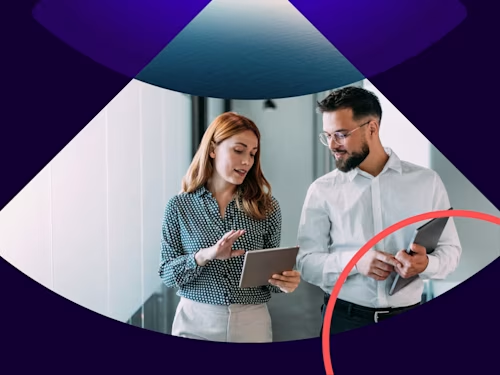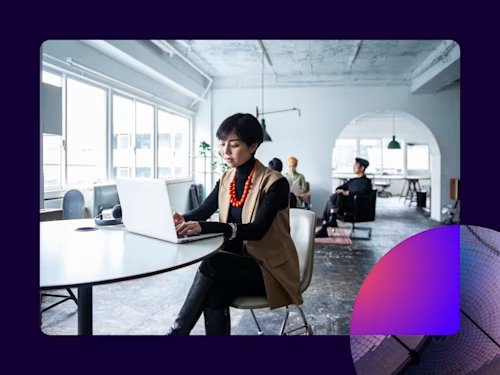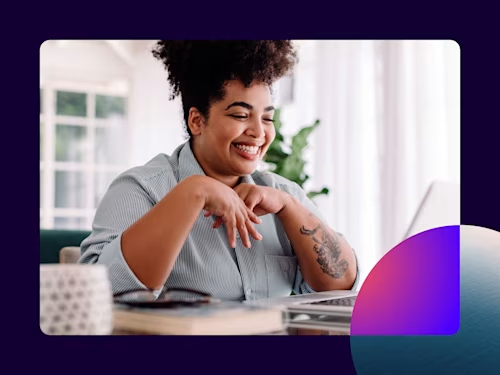
Leading with Advocacy: Q&A with Shanthi Iyer, CIO
We sat down with Shanthi Iyer, CIO, to learn about what inspires her and what she thinks about the role of CIO.

We sat down with Shanthi Iyer, CIO, to learn about what inspires her and what she thinks about the role of CIO and building infrastructure to improve employee productivity and the customer experience.
As Docusign’s Chief Information Officer, you’re responsible for developing solutions to improve the employee experience to accelerate growth. How did your career bring you to this point?
I started my career as a software practitioner, wrote code and managed databases. Over time, I took on designing, developing and implementing large scale systems and became known as someone who can drive large scale change. For me, three things had to come together to create something impactful: technology, business process and data. I played roles where I was at the intersection of these three. Technology solves or automates business processes and data tells a story. I learned to be good at connecting the dots between technology and business while leveraging the data footprint to tell a convincing story.
What attracted you to join Docusign?
First and foremost is the fact that Docusign is a growing SaaS company. I was on the lookout for SaaS companies primarily because they are digital from the get go. The second thing that attracted me was talking to the Docusign leadership team. The conversations about culture, doing the work of your life and sustainability resonated with me. Every time people use Docusign eSignature we are saving trees and the forests--I never thought about Docusign that way. I previously just thought about digital automation, but the company is so much more than that.
Collaborating with other leaders across the organisation will be key to improving the employee experience and scaling the organisation. What do you see as your biggest challenge ahead?
Making an integrated plan is what I will be focused on for the next year. We need everyone aligned so we know where we’ve drawn the lines and set expectations while responding to business needs.
Everybody wants to run fast, and we have to understand that we cannot independently run fast and hit a common goal -- our teams have to hold hands and come together. The first thing we’re instituting is a cross-functional team interlock intake process for Informational Technology platforms and services. Then, we do some background homework on what each request would take to accomplish and have a prioritisation conversation with our business partners. Some initiatives are going to fall below the line and not be done; some will make the cut; and, we have to ask leaders which ones should come down, so another can move up.
Cybersecurity is now top of mind for customers, employees and management. What role does your team play to handle cyber threats?
Cybersecurity is everybody's job. Much of the time people feel that another team will handle it, but it doesn’t work that way. Once the policies are laid out, our job is to ensure they are implemented and operationalised everywhere. We are implementing more quality checks and security gates during the development process so that when a product is ready to go live any security vulnerabilities have already been resolved. Security is part of our operational excellence.
At Docusign, leadership often speaks about the Anywhere Economy. How does the shift to more remote working impact your approach to supporting the employee experience at Docusign?
The first element I would highlight is that my team needs to provide the same experience–regardless of where you are– so you can access all the systems and support that you have access to in the office. So you can work from that coffee shop. And the second element is that we need to ensure you can have that same parity of experience while also enjoying the same privacy and security protection you would have in our offices. It's much easier to lock things down in a building vs "anywhere". These are the top two needs, I would say, that are probably most critical in turning on the anywhere economy experience for our employees.
As a manager, there is a third element: I'm also thinking about how I can augment that hybrid work environment with periodic, in-person engagement, so that the productivity is still there. Microsoft just came up with a study that revealed a productivity drop off when people are remote. A few weeks ago, my team needed to work on our priorities so I brought them into the office for a two-day workshop. That was an eye opener. Many of us met in person for the first time. Many people had joined in the last six months so they were not comfortable holding each other accountable. Yet, we were very candid in the room in a way that we were not on the phone. Getting together helped build a sense of camaraderie and trust, and that time together will support our ability to work effectively when we work remotely as well.
You once said that having a mentor is not enough, you need an advocate. How do you advise your team members to find and nurture relationships with advocates to support their career goals?
Advocates are powerful, and you never forget them. As a part of advocating for your top talent, sometimes you need to let them go because it's the right thing to do for that person and their career. Mentoring can be more like a chore. With advocacy, you are taking responsibility to help grow that person, even if it means you may lose your top talent as they move on. Initially it was hard for me to learn to do this. I want to hang on to good talent, but I had a great advocate– the CEO of my company at the time–who was brutally honest with me. She told me–to my face–that I was the problem and needed to let people move on because others would see me do that and would want to work for me. I had never thought about it that way. She also told me that I needed to have three more jobs before I was ready to become a CIO, and she was right. She had a profound impact on my career. For me, advocacy has come in the form of very direct feedback, and it changed my management approach.
Developing the skills necessary to manage teams isn't easy. How did you hone your skills to be a strong people manager?
I was a poor people manager the first year to be honest. Early in my career I was assigned to manage a team of my peers, and it didn't go over very well with them. It was a change for me too. Whereas we used to all go to coffee together, now they went without me. It was upsetting. And then it was my husband who encouraged me to give them space and time -- while also continuing to support and fight for them. Show them they have your support by getting them resources, raises and promotions. And so I did that. And it worked. It brought us back together. I think part of learning is becoming self-aware.
How else did you develop your skills in general to become a leader?
One of my mentors told me, "know what you are good at and learn to articulate that." Where I grew up, you didn't speak up, certainly not about yourself. And I have a very deep voice, especially for a woman. I was teased about it in my family. So I was very self-conscious of the sound of my voice and didn't think about it as a strength until later in my career, when a coach told me, "your voice is your power. When you speak, everybody stops talking and they listen." And that was an "ah-ha" moment for me.
I started learning how to be more concise in my communication. I also had to learn how to talk about my strengths comfortably without thinking I was being pompous. I had to go through some training.
For me, writing it down works. So I had to write it down, repeat, rinse and repeat to get it to a point where I was comfortable saying whatever it was. My English vocabulary, to be quite honest, is very simple. I once asked a friend, a great orator, to help me write down my strengths. When I read the words it sounded great, but it wasn't me. And everybody would know it right away. I had to find my own words, write them down, cut and paste and practice until it felt familiar. It's important for us each to be heard, but it has to also be authentic.
Besides work, what other endeavours do you find gratifying?
I love hiking, boxing, yoga, spending time with my family and traveling to India. There is something about being in India that gives me immense pleasure. I love the noise, the mess, everything. When I'm here, I miss being there, but when I go there, I miss being here.
Interested in doing the work of your life at Docusign? Check out our openings. We'd love to talk more. "
Related posts
Docusign IAM is the agreement platform your business needs



